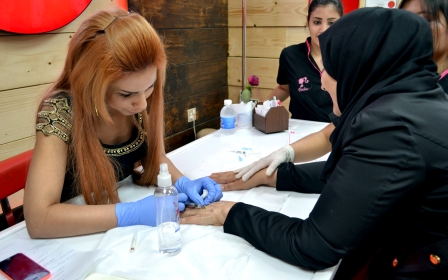Iraqi PM calls on US-led coalition to provide more weapons for IS fight

Iraqi Prime Minister Haider al-Abadi called on the international coalition battling the Islamic State group to provide his country's forces with more weapons to fight the militants.
"Iraq needs weapons and the international community has the ability to provide Iraq with the weapons it needs," he told reporters after a meeting of 21 coalition members in London.
Abadi said the plummeting oil price had been "disastrous" for Iraq, which is on the frontline of the fight against IS militants who seized parts of his country and Syria last year.
He said his presence at the meeting alongside US Secretary of State John Kerry and other foreign ministers was to secure a commitment from the coalition of more help.
"I'm personally here to get more support from our partners," Abadi said.
He said there had been a positive reaction to his request to defer payments on the delivery of munitions and armaments, and said there had also been a recent increase in the delivery of those.
But he stressed: "We don't want to see a military defeat because of budget and fiscal problems."
Abadi was speaking at a press conference flanked by Kerry and British Foreign Secretary Philip Hammond, who both said they would ensure Iraq's security forces had the equipment they needed.
"We've heard very clearly what he said," Hammond said, adding: "This campaign is not going to fail for want of some guns or some bullets in the hands of the Iraqi security forces."
Kerry and Hammond co-hosted the talks involving 21 of the 60-odd countries that are working together to tackle the militant IS group based in Syria and Iraq.
It was the first time the US-led coalition has met since this month's Paris attacks that left 17 dead.
Twelve people were killed in a shooting at French magazine Charlie Hebdo this month by gunmen affiliated with al-Qaeda, while a third attacker who shot dead a policewoman and attacked a Jewish supermarket, killing four, claimed he was working on behalf of IS.
The attacks rekindled fears about the dangers posed by well-trained jihadists returning from foreign battlefields.
European police agency Europol estimates up to 5,000 EU citizens have gone to join the ranks of militants in Syria and Iraq.
EU foreign policy chief Federica Mogherini said the attacks in France "were a little bit like our own 9/11", hitting at "symbols of our culture, of our values, like the media freedom, the police, the Jewish community".
New MEE newsletter: Jerusalem Dispatch
Sign up to get the latest insights and analysis on Israel-Palestine, alongside Turkey Unpacked and other MEE newsletters
Middle East Eye delivers independent and unrivalled coverage and analysis of the Middle East, North Africa and beyond. To learn more about republishing this content and the associated fees, please fill out this form. More about MEE can be found here.




